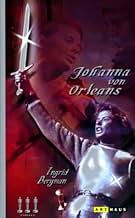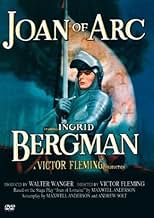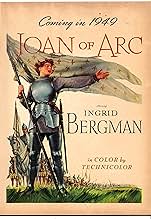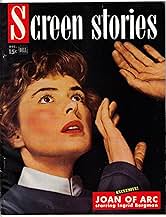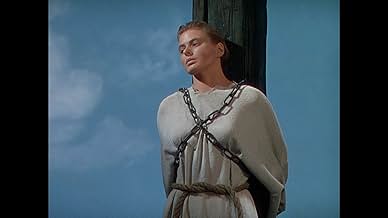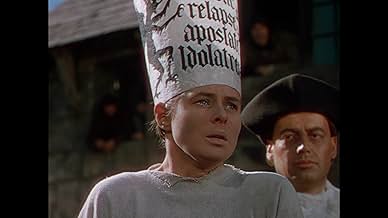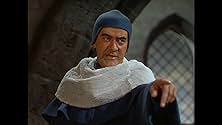IMDb RATING
6.4/10
4.1K
YOUR RATING
The abbreviated life of the 15th-century French heroine.The abbreviated life of the 15th-century French heroine.The abbreviated life of the 15th-century French heroine.
- Won 2 Oscars
- 7 wins & 7 nominations total
Jimmy Lydon
- Pierre d'Arc - Her Younger Brother
- (as James Lydon)
Featured reviews
A very poor film translation of a stage play--rather than being tailored to the movie medium, this is very stagy, overly talky. The dialogue is arty and artificial. Everyone is obviously acting, giving a performance, though Bergman is radiant and her performance is passionate and sincere.
All of the exteriors (outdoor shots) which feature close ups of the lead actors are obviously shot on a sound stage. Some beautiful outdoor footage is used occasionally for establishing shots or transitions between scenes, but Bergman never leaves the soundstage.
On the positive side, the film is beautifully photographed, many individual shots are works of art, masterfully lit and composed. However, the camera moves only when necessary to follow the actors, the shots are static, adding to the staginess of the production. Which reminds me of CB DeMille; you could get a good idea of this film by saying it's like a DeMille film, only with more high art pretensions and less spectacle (no cast of thousands here).
The most outstanding aspect of 'Joan of Arc' is the music, it's prominently featured, good and loud, and it deserves to be--it's gorgeous.
The DVD has no extras at all, though the image and sound are excellent--a very good restoration job. A commentary track would have been very welcome; my guess is this was a challenging production, possibly with a long production period (three cinematographers are listed). It was a commercial failure, at least in part because of public condemnation of Bergman's personal life. I believe director Victor Flemming died soon after production. Lots of meat here for an interesting commentary or two.
All of the exteriors (outdoor shots) which feature close ups of the lead actors are obviously shot on a sound stage. Some beautiful outdoor footage is used occasionally for establishing shots or transitions between scenes, but Bergman never leaves the soundstage.
On the positive side, the film is beautifully photographed, many individual shots are works of art, masterfully lit and composed. However, the camera moves only when necessary to follow the actors, the shots are static, adding to the staginess of the production. Which reminds me of CB DeMille; you could get a good idea of this film by saying it's like a DeMille film, only with more high art pretensions and less spectacle (no cast of thousands here).
The most outstanding aspect of 'Joan of Arc' is the music, it's prominently featured, good and loud, and it deserves to be--it's gorgeous.
The DVD has no extras at all, though the image and sound are excellent--a very good restoration job. A commentary track would have been very welcome; my guess is this was a challenging production, possibly with a long production period (three cinematographers are listed). It was a commercial failure, at least in part because of public condemnation of Bergman's personal life. I believe director Victor Flemming died soon after production. Lots of meat here for an interesting commentary or two.
(NOTE: This review concerns the 100-minute edited cut shown on TCM.)
This 1948 version of Joan of Arc's story is a big disappointment considering the talent involved: director Victor Fleming, who directed both GONE WITH THE WIND and THE WIZARD OF OZ in 1939, and a cast including Ingrid Bergman, José Ferrer, and Ward Bond. JOAN OF ARC (1948) fails to live up to any expectations.
The editing is amateurish. There are abrupt cuts from one shot to the next, often cutting off bits of dialogue on the soundtrack. The voice- over does its job in setting the scenes within a historical narrative, but gives the movie an air of vintage "making of" TV specials. It almost seems as if stand-alone scenes were shot without knowing how to weave them together.
The storytelling is too sincere and sentimental, giving the film an awkward hokey sensibility. Whereas Carl Theodor Dreyer's 1928 masterpiece THE PASSION OF JOAN OF ARC left room for interpretation regarding matters of divine intervention, this version is pretty straightforward about holy miracles, playing like a Sunday school movie. That is to say it's a religious fable about Ste. Joan of Arc, rather than a historical piece about Joan rallying her countrymen against English rule. (Not that there's anything wrong with that.)
Ingrid Bergman was actually nominated for an Academy Award for her portrayal of Joan, a French teenager in the 1400s who believed she was called upon by God to raise an army against the English occupation of her country, later to be convicted of heresy by a council of pro-English clergymen. (It was Bergman's fourth nomination out of a career total of seven, including three wins.) José Ferrer also earned a nomination, playing the French Dauphin whom Joan fought to put on the throne. The top performances were by Bergman as Joan, Francis L. Sullivan as the corrupt judge, and J. Carrol Naish as a slimy one-eyed nobleman. Much of the supporting cast is second-rate.
Maybe JOAN OF ARC is only unimpressive today as viewed by modern cynics. Or perhaps the trouble lies with the existing copies of the film. Whatever the case may be, the movie earned seven Oscar nods (including Best Editing!) and won an honorary award for its moral values.
NOTE: Apparently the original release was a 145-minute cut, which was trimmed down to 100 minutes with added voice-over narration. This chopped-down version is shown on TV and is an embarrassing mess. The 145-minute version won the awards and is supposedly available on DVD.
UPDATE 1/9/12: The full 145-minute version (just shown on TCM) is clearly superior to the edited-down version with the awful narration. It's an ambitious production, although its Sunday School tone is still a bit over-the-top (at least for this reviewer). The film takes itself way too seriously overall, but Jose Ferrer brings personality to the proceedings and Francis L. Sullivan stands out in his villainous role. The second half, with Joan's trial at the hands of the wicked Sullivan, is more effective than the first half and Ingrid Bergman's best moments are in her final scene.
5/10 for the butchered version; 6.5/10 for the full-length epic
This 1948 version of Joan of Arc's story is a big disappointment considering the talent involved: director Victor Fleming, who directed both GONE WITH THE WIND and THE WIZARD OF OZ in 1939, and a cast including Ingrid Bergman, José Ferrer, and Ward Bond. JOAN OF ARC (1948) fails to live up to any expectations.
The editing is amateurish. There are abrupt cuts from one shot to the next, often cutting off bits of dialogue on the soundtrack. The voice- over does its job in setting the scenes within a historical narrative, but gives the movie an air of vintage "making of" TV specials. It almost seems as if stand-alone scenes were shot without knowing how to weave them together.
The storytelling is too sincere and sentimental, giving the film an awkward hokey sensibility. Whereas Carl Theodor Dreyer's 1928 masterpiece THE PASSION OF JOAN OF ARC left room for interpretation regarding matters of divine intervention, this version is pretty straightforward about holy miracles, playing like a Sunday school movie. That is to say it's a religious fable about Ste. Joan of Arc, rather than a historical piece about Joan rallying her countrymen against English rule. (Not that there's anything wrong with that.)
Ingrid Bergman was actually nominated for an Academy Award for her portrayal of Joan, a French teenager in the 1400s who believed she was called upon by God to raise an army against the English occupation of her country, later to be convicted of heresy by a council of pro-English clergymen. (It was Bergman's fourth nomination out of a career total of seven, including three wins.) José Ferrer also earned a nomination, playing the French Dauphin whom Joan fought to put on the throne. The top performances were by Bergman as Joan, Francis L. Sullivan as the corrupt judge, and J. Carrol Naish as a slimy one-eyed nobleman. Much of the supporting cast is second-rate.
Maybe JOAN OF ARC is only unimpressive today as viewed by modern cynics. Or perhaps the trouble lies with the existing copies of the film. Whatever the case may be, the movie earned seven Oscar nods (including Best Editing!) and won an honorary award for its moral values.
NOTE: Apparently the original release was a 145-minute cut, which was trimmed down to 100 minutes with added voice-over narration. This chopped-down version is shown on TV and is an embarrassing mess. The 145-minute version won the awards and is supposedly available on DVD.
UPDATE 1/9/12: The full 145-minute version (just shown on TCM) is clearly superior to the edited-down version with the awful narration. It's an ambitious production, although its Sunday School tone is still a bit over-the-top (at least for this reviewer). The film takes itself way too seriously overall, but Jose Ferrer brings personality to the proceedings and Francis L. Sullivan stands out in his villainous role. The second half, with Joan's trial at the hands of the wicked Sullivan, is more effective than the first half and Ingrid Bergman's best moments are in her final scene.
5/10 for the butchered version; 6.5/10 for the full-length epic
After what seems like gargantuan efforts to obtain the DVD and the necessary equipment I have finally managed to see the uncut version of Joan of Arc.
I am thrilled with this new DVD and will add nothing further to the positive comments that have already been made. However I should like to pay particular tribute to the wonderful music of Hugo Friedhofer. Of course, for years I loved his score for 'The best years of your life' but in terms of writing for an earlier period I never regarded this composer is quite the same league as, say, William Walton, whose Shakespeare/ Olivier scores were so memorable. But I have been forced to revise my opinion.
It was Max Reger who commented to the English composer Vaughan Williams: 'you have a veritable obsession with the flattened seventh' Well so, it seems does Mr Friedhofer! I suppose one either likes or loathes pastiche and modal writing. I adore it, and think that in Joan of Arc we get the best of both worlds. The music has a direct and powerful emotional appeal. It could scarcely fail to have. Yet given the fact that Friedhofer uses C20th conventions, harmonies, instruments and musicians, his 'nods' in the direction of C15th French church music are tastefully enough done for us to feel that such scenes as the coronation are, if not exactly in any sense 'authentic' then still marvellously effective.
I should dearly love to know whether anyone has arranged the score into a suite of pieces and recorded it. That would be a rare treat. Perhaps some other readers can advise?
I am thrilled with this new DVD and will add nothing further to the positive comments that have already been made. However I should like to pay particular tribute to the wonderful music of Hugo Friedhofer. Of course, for years I loved his score for 'The best years of your life' but in terms of writing for an earlier period I never regarded this composer is quite the same league as, say, William Walton, whose Shakespeare/ Olivier scores were so memorable. But I have been forced to revise my opinion.
It was Max Reger who commented to the English composer Vaughan Williams: 'you have a veritable obsession with the flattened seventh' Well so, it seems does Mr Friedhofer! I suppose one either likes or loathes pastiche and modal writing. I adore it, and think that in Joan of Arc we get the best of both worlds. The music has a direct and powerful emotional appeal. It could scarcely fail to have. Yet given the fact that Friedhofer uses C20th conventions, harmonies, instruments and musicians, his 'nods' in the direction of C15th French church music are tastefully enough done for us to feel that such scenes as the coronation are, if not exactly in any sense 'authentic' then still marvellously effective.
I should dearly love to know whether anyone has arranged the score into a suite of pieces and recorded it. That would be a rare treat. Perhaps some other readers can advise?
This Ingrid Bergman film was so under-rated. She put her heart and soul into acting the part of her great heroine and then the film was not only slated at the box office but horrendously cut when issued for television and on video. WHY?????? We know it didn't do well at the box office, because of the circumstances of Ingrid's private life in 1949 and 1950 - sadly, Hollywood and the whole world judged this lovely lady and they shouldn't judge anyone, ever!!! Miss Bergman was a lady and a great actress. But why was the film cut for video? The cut version, with silly voice overs and maps, is not one iota as good as the full version, where we see the young Joan and her experiences of her voices and also have a fuller version of the trial - where her acting is nothing short of brilliant. I hope someone who is able to influence the issuing of the entire film on DVD reads this comment! Mary
In Europa,I've often heard people complaining .Why has the movie been boiled down to a digest of barely 100 min? In France,Joan's native country,it's a scandal!It was broadcast on the history channel yesterday and again in the "short" editing.It seems that many scenes were replaced by a voice over which is infuriating ,cause Fleming's version of "Joan Of Arc" ,although inferior to Preminger's and Dreyer's works, is quite interesting.
Although too old for the part,Ingrid Bergman had enough charisma to make you forget that Joan was 17 when her epic began.Fleming's style is far away from Dreyer's bare aestheticism or Luc Besson's video game battles.Holy picture best describes his way of filming Joan,which makes sense ,cause it begins with the heroine's canonization (only in 1920!).
Good things:La Tremouille's bad influence on the king;Joan who did not realize in 1430 that fighting had been replaced by negotiations;the abjuration: in Rouen,you can see a commemorative plaque which reads "Here ,in 1431, Joan of Arc suffered the infamous ordeal of abjuration" .On the "Place du Vieux Marché" ,where she was burnt alive,another plaque reads "To you,Joan,who knew that a hero's grave was the heart of the living." (André Malraux)
Although too old for the part,Ingrid Bergman had enough charisma to make you forget that Joan was 17 when her epic began.Fleming's style is far away from Dreyer's bare aestheticism or Luc Besson's video game battles.Holy picture best describes his way of filming Joan,which makes sense ,cause it begins with the heroine's canonization (only in 1920!).
Good things:La Tremouille's bad influence on the king;Joan who did not realize in 1430 that fighting had been replaced by negotiations;the abjuration: in Rouen,you can see a commemorative plaque which reads "Here ,in 1431, Joan of Arc suffered the infamous ordeal of abjuration" .On the "Place du Vieux Marché" ,where she was burnt alive,another plaque reads "To you,Joan,who knew that a hero's grave was the heart of the living." (André Malraux)
Did you know
- TriviaThe first film to receive 7 Academy Award nominations without receiving a Best Picture nomination.
- GoofsLength of Joan's chain mail is different from 43:38 to 44:29.
- Quotes
La Hire: Why are you crying?
Joan of Arc: Because they're dead. Horribly dead. And it was I who killed them.
La Hire: Killed who?
Joan of Arc: All these men. Ours, and the enemy's.
La Hire: Huh! Are you crying about the English?
Joan of Arc: I have no hatred for the English. I spoke bold and loud so that you would follow me. I thought victory would be beautiful, but it is an ugly, bloody thing.
La Hire: Why, there never was a more beautiful victory than this!
- Crazy creditsIn the 145-minute version of the film, the cast list, naming not only the actors but who they played, was deliberately presented in the style of the cast list of "Gone With the Wind", in order to evoke the feeling of an epic about to be presented. Victor Fleming, who directed "Joan of Arc", had also directed "Gone With the Wind" (after replacing George Cukor, "GWTW"'s original, uncredited director).
- Alternate versionsIn 1998, UCLA restored "Joan of Arc" to its original length of 145 minutes, and the complete version was finally given its first public screening in nearly fifty years on December 3, 1998.
- ConnectionsFeatured in Le roi pirate (1953)
- How long is Joan of Arc?Powered by Alexa
Details
- Release date
- Country of origin
- Languages
- Also known as
- Juana de Arco
- Filming locations
- Balboa, Newport Beach, California, USA(Assault on the Tourelles)
- Production companies
- See more company credits at IMDbPro
Box office
- Budget
- $4,600,000 (estimated)
- Runtime
- 2h 25m(145 min)
- Color
- Aspect ratio
- 1.37 : 1(original release)
Contribute to this page
Suggest an edit or add missing content

